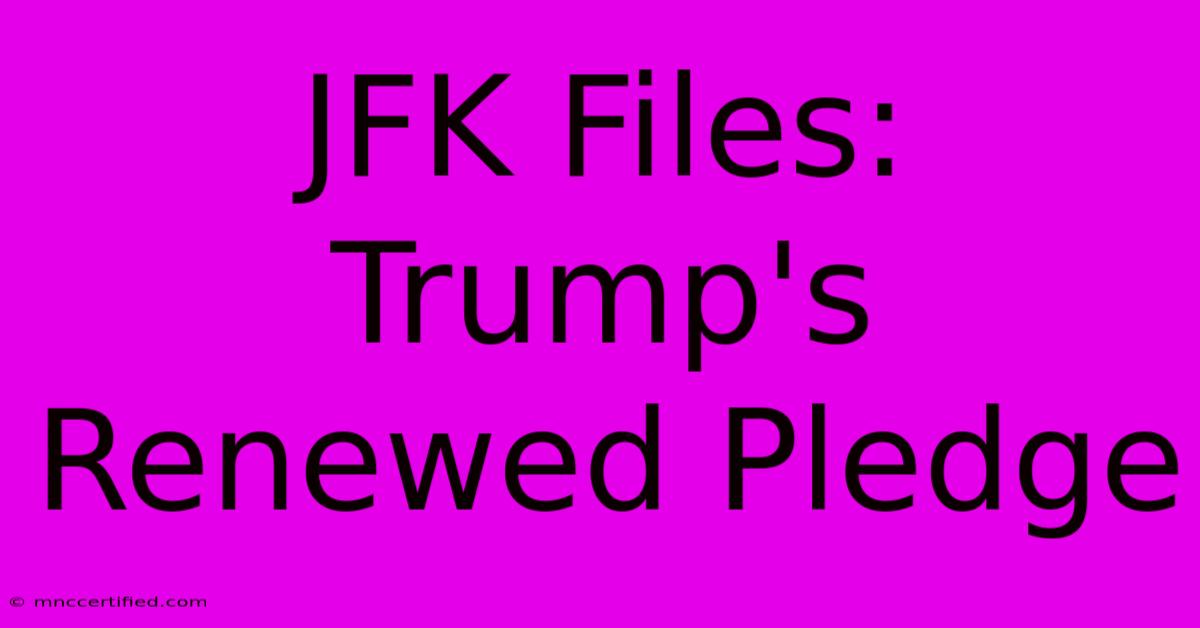JFK Files: Trump's Renewed Pledge

Table of Contents
JFK Files: Trump's Renewed Pledge – Unlocking Decades of Mystery?
The release of JFK assassination files has been a long and winding road, punctuated by deadlines and controversies. President Trump's renewed pledge to fully declassify these documents reignited a debate that has captivated the public for over six decades. This article delves into the history surrounding the JFK assassination files, Trump's involvement, the ongoing debate, and the potential implications of full declassification.
The History of the JFK Assassination Files
The assassination of President John F. Kennedy on November 22, 1963, remains one of the most scrutinized events in American history. The subsequent investigations, most notably the Warren Commission, generated a massive volume of documents. These files, housed within various government agencies, contain a wealth of information – witness testimonies, autopsy reports, FBI and CIA investigations – fueling countless theories and controversies. The sheer volume and sensitivity of this information have made complete declassification a complex and contentious process. The JFK Records Act of 1992 mandated the release of these files, setting deadlines with provisions for postponement in cases of national security concerns.
Previous Attempts at Declassification & Their Shortcomings
Several presidents have grappled with the release of these files. While significant portions have been made public over the years, many documents remain classified under the guise of national security. Previous attempts have faced criticism for being incomplete and for seemingly prioritizing national security concerns over public transparency. This has only fueled speculation and distrust amongst those who believe the government is withholding crucial information about the assassination.
Trump's Renewed Pledge: A Shift in Transparency?
President Trump's repeated promises to fully declassify the remaining JFK files marked a significant shift in the public discourse. His pronouncements, while generating considerable excitement amongst JFK assassination researchers and enthusiasts, also raised concerns amongst intelligence agencies worried about potentially compromising sensitive information. The exact nature and extent of his involvement, however, remain a topic of debate, with some arguing that his actions were driven by transparency while others suggest a more politically motivated agenda.
The Debate: National Security vs. Public Transparency
The core of the debate revolves around balancing national security concerns with the public's right to know. Proponents of full declassification argue that the passage of time has diminished any potential harm to national security, and that the public deserves access to the complete truth surrounding this pivotal historical event. Conversely, opponents argue that releasing certain documents could compromise intelligence sources and methods, potentially jeopardizing ongoing national security operations. This conflict highlights the inherent difficulties in reconciling these competing interests.
Potential Implications of Full Declassification
The potential implications of fully declassifying the JFK assassination files are far-reaching. It could lead to:
- New insights into the assassination: The release of previously unseen documents could shed new light on the events surrounding the assassination, potentially altering existing narratives and theories.
- Renewed public debate: The declassification could reignite public debate about the assassination, leading to new investigations and analysis.
- Potential challenges to established narratives: Newly released information could challenge established narratives, forcing a re-evaluation of the official findings of the Warren Commission and subsequent investigations.
- Impact on public trust: The outcome could significantly impact public trust in government institutions and their handling of sensitive information.
SEO Considerations for this Article:
Keywords: JFK files, JFK assassination, Trump, declassification, national security, Warren Commission, JFK Records Act, conspiracy theories, public transparency, CIA, FBI
On-Page SEO: The article utilizes headers (H2, H3) to structure the content logically. Bold text emphasizes key points and keywords. Internal linking could be added (if this were part of a larger website) to related articles on JFK, the Warren Commission, or other historical events.
Off-Page SEO: Promoting this article through social media channels relevant to history buffs and political commentators is key. Guest posting on relevant websites and building high-quality backlinks are also crucial for improving search engine ranking.
The ongoing saga of the JFK files and President Trump's renewed pledge presents a fascinating case study in the intersection of history, politics, and national security. The ultimate impact of any further declassification remains to be seen, but it undoubtedly holds the potential to reshape our understanding of one of the most enduring mysteries in American history.

Thank you for visiting our website wich cover about JFK Files: Trump's Renewed Pledge. We hope the information provided has been useful to you. Feel free to contact us if you have any questions or need further assistance. See you next time and dont miss to bookmark.
Featured Posts
-
Wicked Film Changes From Stage Musical
Nov 23, 2024
-
Home Win For Monaco Akliouche Scores Twice
Nov 23, 2024
-
Bayern Munich Vs Augsburg Live Stream
Nov 23, 2024
-
Coleen And Wayne Rooneys Issues
Nov 23, 2024
-
Australias Poor Start India Vs Aus Day 1
Nov 23, 2024